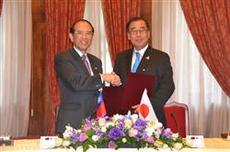 Source: sankei.jp,msn.com
Source: sankei.jp,msn.com In many respects President Ma had every right to drawn attention to the outcome of negotiations, especially considering that it was his government that had first proposed ‘East China Sea Peace Initiative’ that called for joint resource management with Japan. While expectations were that Japan would continue to ignore calls for joint administration out of concern that recognising the claims of another state might jeopardise Japan’s position of the ‘non-existence’ of any territorial dispute with its neighbour (and concerns how dealing with Taiwan would be perceived in China), this (astonishingly fast) turnaround in Japan’s position appears to have been aimed at one state in particular – China. By recognising Taiwan’s right to fish in the EEZ in exchange for giving up any persistent territorial claims, Japan and Taiwan have shown a willingness to put aside their respective territorial positions in the interests of regional stability. This will, no doubt, be looked upon very favourably by the region, and, as John Lee has outlined here (firewalled), will place pressure on China to make similar concessions.
Of course, China has shown no willingness to consider any resource sharing agreements of late, indeed the Chinese reaction to the above news was to express “extreme concern” with the deal between its two rival claimants. According to this article in the South China Morning Post, part of the deal between Taiwan and Japan gives Taiwanese coast guard vessels the authority to expel any mainland Chinese trawlers caught fishing within the newly established fishing zone (how this would differentiate from Japanese coast guard vessels expelling Chinese fishing trawlers from the same EEZ is not explained).
The formation of such an agreement does at least show that progress in territorial claims can be made if both sides are aware of the advantages in sidelining their demands. Taiwan gains access to a limited section of the Japanese EEZ, while Japan gains a more progressive relationship with Taiwan to offset its current difficulties with Beijing. Quite possibly Washington may have had some influence in persuading Japan to accept the Taiwanese proposal, if only to reduce tensions over territory among (supposed) friends and allies. Of course, any decision to allow Taiwanese vessels into Japan’s EEZ will affect Okinawan fishing industries, and it is worth noting that Okinawan Prefectural Governor Nakaima objected to the agreement almost as soon as it had been announced (Link-J). Once again, Okinawa has found itself in an awkward position vis-à-vis Japan’s foreign relations – agree to the government’s position and suffer a potential loss in revenue, or object and risk Tokyo”s ire in impeding relations between two potential allies.
Ultimately Japan and Taiwan managed to find a solution to their differences at that should be applauded. What is more difficult to discern is whether the decision to agree to the pact will impact on the government’s already troubled relationship with Okinawa.


 RSS Feed
RSS Feed